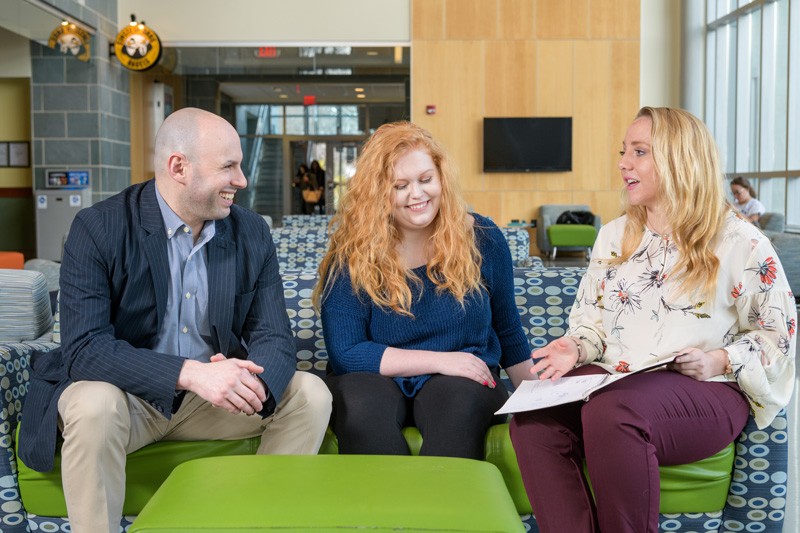From Students to Scholars

Undergraduate research enhances UD experience
As an assistant professor in the University of Delaware’s School of Education (SOE), Joshua Wilson frequently employs undergraduate assistants to provide support for grant-funded research projects.
For some projects — as with a recent $400,000 research grant from the Institute of Education Sciences (IES) — Wilson may need to assemble an entire team of assistants to help collect and analyze massive troves of data.
Being able to tap into UD’s talent pool of intelligent and ambitious students is one of the advantages of serving on the faculty of a top-tier research university. But as Wilson eagerly points out, students are the real beneficiaries. Working on a faculty research project provides students with opportunities for scholarly training, professional development and the kinds of unique learning experiences that enhance a college education.
In 2018, Wilson reached out to the University of Delaware Research Apprenticeship Work-Study (UDRAW) program to help connect him to undergraduate research assistants for a new project to quantify writing knowledge among elementary-age students.
“We know that a student’s knowledge about a domain, such as writing, is related to how they perform in that domain,” said Wilson. “We predict that students who are able to express knowledge about writing will in turn write better than their peers.”
Wilson and a colleague had previously coordinated with a local school district to have students in grades 3 through 5 answer two questions: What do you know about writing? And what does it take to be a good writer? About 175 students were asked to reflect on those questions and then write a short essay describing their views.
With essays in hand, Wilson first hired Mckenna Winnie, a human services major, to help organize the data. Her task was to categorize sentences, or parts of sentences, into 72 different types of “idea units” that demonstrated knowledge about writing, such as punctuation, motivation, effort, environment, and so forth. For example, if a student answered “you need to have a pencil and paper” that would be one idea unit, and “you have to organize your thoughts” would be another.
In other words, Winnie had to transform subjective essays into objective data.
Winnie had previously collected demographic data as a phone surveyor at UD’s Center for Applied Demography and Survey Research (CADSR), so this type of work was right up her alley.
“I loved doing the research,” Winnie said. “The responses were completely unfiltered, which was actually kind of funny sometimes, having to interpret what the kids were trying to say or trying to spell but it’s just not even close to what they think they’re saying.”
After Winnie completed the initial review of student responses, Wilson hired another research assistant, Ally Raiche, to help organize and verify the validity of the data. Raiche, a first-year student majoring in elementary teacher education, had no prior research experience. This project was an opportunity to begin learning about the field before taking upper-level classes.
“Josh taught me so much,” said Raiche, who during the spring semester is enrolled in a class called EDUC 440: Literacy Instruction for English Language Learners. “I feel like I know a lot more about literacy because of the research that we worked on. Learning can be done in a classroom, but for me, learning is practicing — going out and getting that in-the-field experience.”
As spring turned to summer, and summer into fall, Raiche and Winnie chipped away at the research project, going through those student responses sentence-by-sentence, and word-by-word, to categorize the various ways in which these kids expressed their knowledge of writing.
Meanwhile, Wilson was able to secure additional funding for Raiche and Winnie thanks to the Dean’s Research Award from the UD’s College of Education and Human Development (CEHD). He even gave them a raise.
Through this research project, Winnie and Raiche not only learned about their respective degree fields. Working with a faculty member opened up new opportunities.
Wilson invited Raiche to accompany him on another research project at Wilbur Elementary School. Raiche was introduced to one of Wilson’s former students, Shelby Dorr, a teacher in the Colonial School District. Raiche was able to see what a career in teaching may look like on a day-to-day basis.
“Applying for this research position gave me more opportunities than I ever expected,” said Raiche. “Without [Professor Wilson] I wouldn’t have felt as comfortable in college. I feel comfortable asking him questions or advice. And for me, as a freshman, that’s so important because I feel like I’m one step ahead. I feel prepared.”
Winnie expressed a similar experience. Working on this research project provided her with a practical knowledge of some of the issues that she would eventually study for her major.
“That job helped me with my research classes,” said Winnie, who is enrolled in a spring semester class called HDFS 328: Introduction to the Research Process, with Michael Ferrari. “Josh was my highlight. He was so helpful for me that whole semester. He’s very much a mentor to me now.”
Wilson credited both students.
“I couldn’t have asked for two better students to work with,” said Wilson, who has since recommended Winnie and Raiche to other faculty members in search of undergraduate research assistants. “I’m just very thankful for their commitment and desire to work on the research project because I think it’s been a win-win-win.”



